Superhero Tales are Turning Into ‘Deathworks’
Leagues of DC fans today find themselves in advanced fandom grief.
This is a strange phenomenon. Yet I can scarcely observe this from outside, for I’m one of them. If you follow my work and side quests, you know that over the years I’ve joined fan efforts to #ReleaseTheSnyderCut, then #RestoreTheSnyderverse.1
Just last night, newbie DC creative chief James Gunn destroyed those dreams. He said they would dismiss Superman actor Henry Cavill (who had recently announced his return) and “reboot” DC films. Having crashed in like Kryptonian villain General Zod, Gunn reduced fans’ hopes to dust. And indeed, I feel like a city resident who’s seen his hometown pulverized in favor of building an alien world.
As a fan, this feeling combines that from a dear friend’s death, getting fired from a job, and getting a novel proposal rejection. I must stress—it is nothing compared with other griefs people suffer, especially at Christmas. Yet this is my little grief.
I just wish that only one fandom had fallen into this nonsense, rather than a whole lot of them. As I survey DC’s new direction and the current courses of Marvel, Star Wars, Doctor Who and beyond, I can’t help but see a shared trend. More creators want to reject sincere storytelling and opt for the manufacture of deathworks.
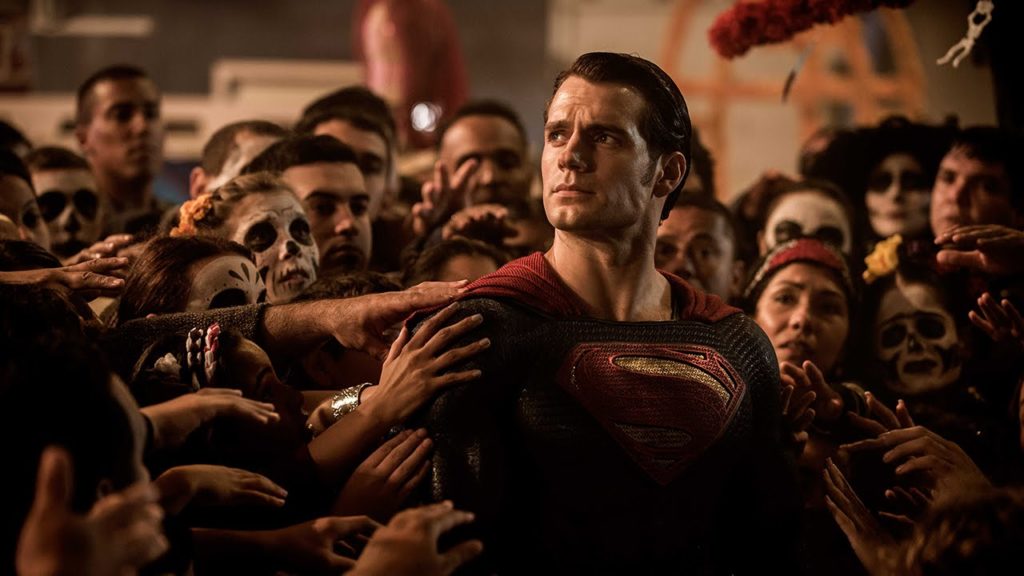
Superman (Henry Cavill) is treated as a deity by a grateful human crowd in Batman v Superman: Dawn of Justice (2016).
‘So begins the end’
To recap, back in October, DC fans and casual fans heard all this within one week:
- Black Adam finally returned Cavill’s Superman to the cinematic DC world, thanks to a brief cameo that fans largely embraced (but some doubted).
- Cavill took to Instagram to confirm he would return as Superman in future projects. Official accounts for DC Comics and Warner Bros. echoed this news.
- New Warner Bros. Discovery CEO David Zaslav (parent company of DC) hired two new co-chairs for DC Studios, including current Marvel director Gunn.
Cavill then went on a media tour talking about his love for Superman, and his hopes for a more obviously joyous, optimistic portrayal of the hero. Of course, not all felt this way about his first take on Superman in 2013’s Snyder-directed Man of Steel.
Yet many fans, including myself, urged patience during that franchise-starter and its nobledark sequel Batman v Superman: Dawn of Justice. “Snyder is sharing a long-form story,” we often said. “Watch the film carefully. Learn its language. Don’t relax back and expect everything to be simple. Lean forward and engage in-depth. Also, listen to Snyder talk about his work. He’s not deconstructing Superman without also reconstructing him, for victorious growth into a more solid version of our hero.”
We might call this a lifework. This kind of story allies with darkness only temporarily and for a purpose. It is not for grim indulgence, but for the greater beauty of breakthrough light and joy. Snyder has not professed Christianity. But he intuits J. R. R. Tolkien’s popular term eucatastrophe—the sudden turn from evil despair into the beautifully overpowered win of goodness. Tolkien did not “hate Frodo” by showing this hero who suffers as he crawls to Mount Doom, then fulfills his great quest and journeys into paradise for a tragic yet beautiful reward. Nor does Snyder “hate Superman” by letting this hero survive a Capitol explosion, despair for humanity, then find healing and purpose.
After fans won their #ReleaseTheSnyderCut battle, the 2021 four-hour epic film proved them right. Snyder’s team wasn’t tearing down heroes, but seeking to honor them. Unlike the shallow plotting of the 2017 movie version, Zack Snyder’s Justice League took its time with Superman’s resurrection and recovery. Film posters may as well have announced: You’ll believe a man can die, before you believe a man can fly.
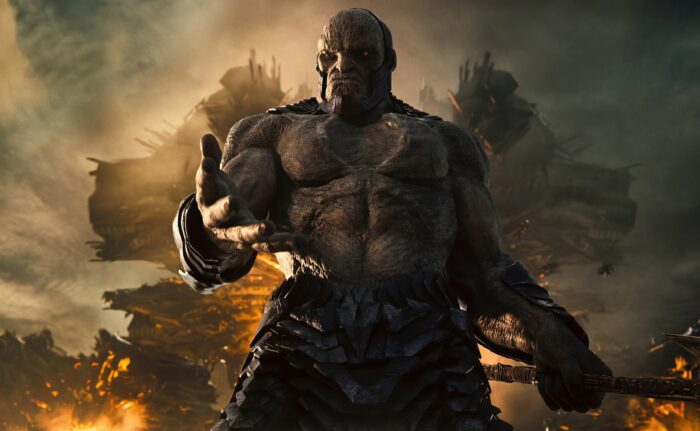
Galactic tyrant Darkseid (voiced by Ray Porter) prepares to conquer another world in Zack Snyder’s Justice League (2021).
‘I have turned one hundred thousand worlds to dust’
Now compare this lifework with the approach of another director, James Gunn.
Justice League’s director Snyder errs on the side of taking superheroes seriously. He wants to explore deeply mythological tales of gods or godlike humans who try to act heroically in a dark and politicized world.2 By contrast, Gunn also says he loves superheroes, but for less-than-earnest reasons:
I love superheroes. I also think they’re the dumbest things that have ever existed. I have no happier times in my life than lying in my bed when I was 12 and reading comic books. I don’t think life got much better than that. And yet the fact that we take these things seriously as adults is ridiculous because people really would look at you like they look at Peacemaker when he walks into Fennel Fields wearing a costume: What’s wrong with you? You think that’s cool? You’re a maniac. The idea that superheroes are maniacs is something I like very much.3
“James Gunn chooses sincerity,” pledged that story’s headline. Many DC fans were not persuaded. Gunn’s streaming show in focus included sexually exploitative lines about Wonder Woman supposedly lusting, and “jokes” about Superman’s supposed sexual perversions. Finally, the finale blessed fans with a reference to Aquaman fornicating fish—after which Atlantis’s noble king blasts Barry Allen with an F-bomb.
These may be the “dumbest thing” heroes we deserve, but not the ones we need.
Yes, Gunn hit big with the edgier-wholesome Guardians of the Galaxy franchise at Marvel. It got a well-reviewed holiday special and everything. Here he lets his sex-flippancy flag fly. That’s about expected for a man who started his career telling “jokes” about sexually assaulting children, women—and fictional superheroes.
“Treating these people like gods is like, ‘Whaat?’” blurted Gunn, the Anti-Snyder.
Whatever his intentions, it’s foolish to assume he was kidding around. When people tell you who they are, listen to them. Critics, for their part, begrudgingly admit that people love superhero stories, but seem to love directors who subvert them. 4
Speaking as a fan and culture observer, we don’t need this nonsense. Some DC fans disliked Snyder’s work because they felt this would deconstruct virtue and heroism. That wasn’t true. But if this fear were true, DC fans would have been right to revolt.
Now we run the risk of actually doing this with DC heroes, yet with smiles and “jokes” that throw many fans off the game. But apart from Gunn’s own plots for a Superman “reboot,” he has started this new career stage with gross dishonor to the legions of fans who invested in Cavill’s Superman, Ben Affleck’s Batman, Gal Gadot’s Wonder Woman, Jason Momoa’s Aquaman, Ray Fisher’s Cyborg, and even Ezra Miller’s The Flash. Apart from next year’s long-delayed movies The Flash (summer 2023) and Aquaman sequel (winter 2023), all these films face imminent reboot. If you dare see them in theaters, you’re tossing your tickets into a superhero graveyard.
‘The lost world is Earth. Anti-Life is here’
Superheroes are not sacred. But to see any director treat these potentially heroic ideals with such flippancy, right down to stupid bathroom jokes, can only bring to mind the term I’ve mentioned: deathwork. Pastor and author Carl Trueman notes:
“Deathwork” is a term used by sociologist Philip Rieff. It refers to the act of using the sacred symbols of a previous era in order to subvert, and then destroy, their original significance and purpose. Rieff uses Andres Serrano’s notorious 1987 picture Piss Christ to illustrate this. The work is a photograph of something considered sacred—in this case a crucifix—submerged in the artist’s own urine. As Rieff puts it, in Serrano’s photo the sacramental has been made excremental. Or, to borrow a phrase from Marx—that which was holy has been profaned.5
Like no other superhero director (not even Thor: Love and Thunder’s Taika Waititi), Gunn may be one who would dunk sacred symbols into bodily waste for the LOLz.
Yet he is not alone in using older “symbols” (in this case, popular hero characters) to “subvert, and then destroy, their original significance and purpose.” The multiplex’s reigning super-champ, Marvel, applied this bad lesson from the success of Thor: Ragnarok (2017). “Fans no longer want serious Thor,” critics and creators seemed to say. “They want more Guardians irreverence all the time. So—out with fun yet more earnest treatments of heroes, and in with quipping, absurdity-revels, and all those moments when serious moments are stepped on by ‘jokes’!”6
This flippancy may have peaked with this summer’s infamous She-Hulk series, which literally ended with the green heroine crawling out of her own Disney+ menu and confronting her own AI “showrunner.” With this oh-so-self-aware maneuver, Marvel exchanged the truth of metahuman tales for cheap meta-references. All is vanity.
Meanwhile, fans swarm lower-budget offerings like Deadpool movies. They cheer dime-a-dozen Amazon Prime violent super-zeroes with their Daring Concept of “what if there was a superhero as powerful as Superman, only, y’know, Eeeevil?”7
Is there no place for subversive and even violent fantastical super-tales? Perhaps. But if everything is subversive, nothing is. If your whole story exists to mock a trope and feel clever about itself, your story offers little reflection of human experience and ideals, to say nothing of human flourishing. Your story becomes a deathwork.
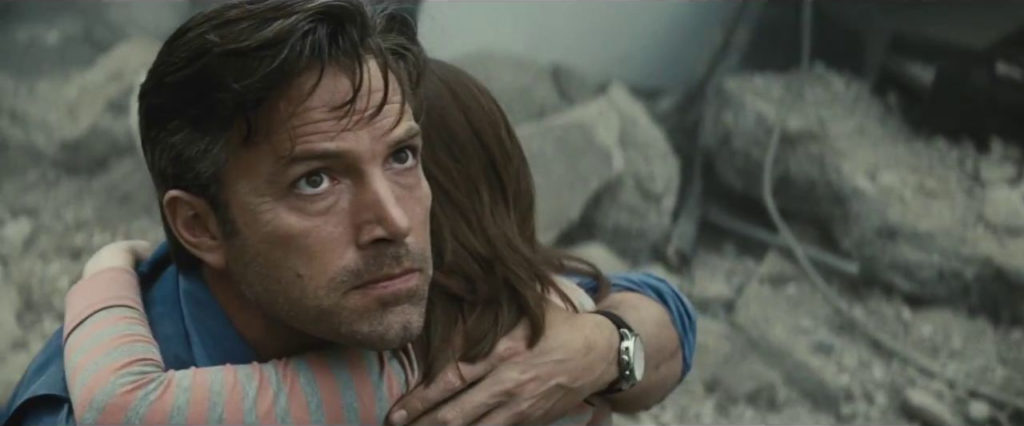
Bruce Wayne (Ben Affleck) grieves and rages at the destruction of his city in Batman v Superman: Dawn of Justice (2016).
‘Come back to the living’
Superhero stories aren’t alone. As many angry-conservative types like to note, other fandoms have fallen into shadow. Here at Lorehaven, for that reason, we’ve barely mentioned that Rings of Power show. (This recent episode may be all you hear from us about that!) We share little coverage of fandoms like Marvel, Star Wars, Star Trek, Doctor Who, and Avatar: The Last Airbender. Honestly, we’d like to do more of this. But we’re reluctant to weaponize newsy complaints for angry clicks. Our creators would rather ignore deathworks (wherever we find them) and embrace lifeworks.
As the Lorehaven publisher and editor as well as podcast co-host and frequent web-janitor, I find grief yet clarity in this seeming death of another fandom. It’s okay for me to grieve. It’s okay to feel angry. The Psalmists did, when they saw wicked creators prosper. The Apostle Paul did, when he entered Athens and saw so many cultural deathworks.8 And so I shall.
I’ll also take action—not just with passionate words like these, but with sobering refusals to enjoy any more Warner Bros. franchises. Unless a seed falls and dies, it cannot return to life. Superman from the Snyderverse gloriously illustrated this truth. Even if this hero never returns, God used this story to show beautiful reality. For that, I need not grieve over franchise deaths like those who have no hope.
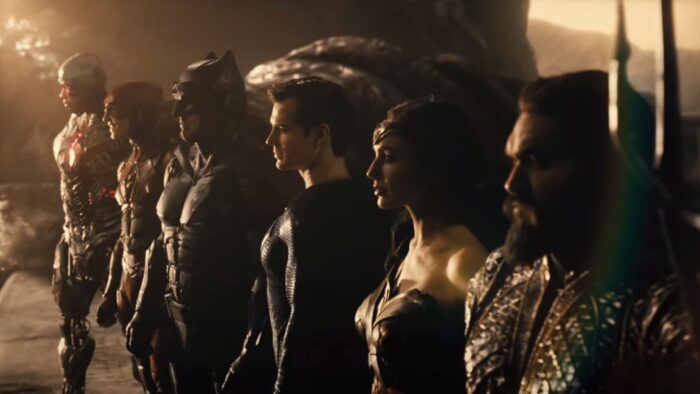
Six metahuman heroes unite after defeating their enemy in Zack Snyder’s Justice League (2021).
‘Fly, son. It’s time’
To close this now-Snyder-length article, I’ll end with a drastically personal account.
Right around the time Zack Snyder’s Justice League released in March 2021, my father died in the hospital of complications from a brain tumor.
I watched my father take his last breath.
In the fallout, I was comforted by Scripture and family care, yet strangely also many earnest and noble teaser trailers for each returning member of the Justice League.
I especially anticipated Superman’s return.
Yet in the days between my father’s death and his funeral, I nearly chose not to watch the film, despite all my advocacy for its release. How could I celebrate a fandom victory for fictional heroes in the midst of such real-world mourning?
But ultimately I did view Justice League, that long-delayed metahuman epic, and I loved it. And oh, how I needed this bombastic story’s reminder that in reality, we live at the ley-lines between supernatural myth and the “ordinary.” In the real world, true heroes always return to life. That’s the biblical truth of resurrection.
Superman is no Christ-figure. But he is a Christian-figure. And if I can enjoy artists like Zack Snyder and actors like Henry Cavill, who show this character rising to life and soaring into the sky, then returning to Earth to defeat space-Satan with laser-swords from his eyes—this helps train my deepest imagination. If I can “believe” a Superman can fly, I’ll better believe that someday I too will join my Hero in the sun.
- Fans used #ReleaseTheSnyderCut to call for director Zack Snyder’s original version of the superhero movie Justice League, cut to bits by corporate meddlers before a Dec. 2017 release. Snyder’s original film finally released to streaming in March 2021. Overjoyed fans then shifted to #RestoreTheSnyderverse, calling for more stories set in Snyder’s metahuman world. ↩
- This means Snyder has made many aesthetic choices to support this worldbuilding, such as ditching the Victorian-strongman “trunks” on Superman’s outfit. He also disregards this “costume” notion in favor of showing him in Kryptonian diplomatic attire, complete with regal red-and-blue colors. Casual viewers will miss this detail. Careful viewers will feel the added touch, even if they never see this explained in making-of documentaries. And back in the 1970s, director Richard Donner pursued a similar approach by showing that Superman’s famed S-shield is in fact the Kryptonian family crest. ↩
- “‘I Love Superheroes. I Also Think They’re the Dumbest Things That Ever Existed.’ After decades skewering the genre, James Gunn chooses sincerity.” Matt Zoller Seitz, Vulture.com, Feb. 18, 2022. ↩
- Even the late great Roger Ebert loved 1978’s original Superman movie because, in his words, the film has “an intelligent sense of humor about itself.” Most fans did not share this sentiment. They fondly remember Donner’s earnest verisimilitude. ↩
- “The Church Among the Deathworks,” Carl R. Trueman, First Things, Oct. 21, 2021. ↩
- The more serious Avengers: Infinity War and Avengers: Endgame (2018–2019) avoided these habits. ↩
- Some accuse Snyder of attempting the same in originally planned Justice League films. Those who listened to the director know that he planned to subvert the subversion, planting story-threads in which Barry Allen reverses a dark timeline. ↩
- Some cultural-engagey sorts of Christians might recall that Paul uses an “unknown god” altar for gospel presentation. I don’t speak here of that goal, but of simpler recreation. We need not be on our Ministry game for every fandom. As I once noted, “In an overbudgeted life already, if I find that creators of a formerly restful story have chosen to twist it into Just More Work, then I may be forced to make a decision. I may be forced to decide: I’m out.” ↩





















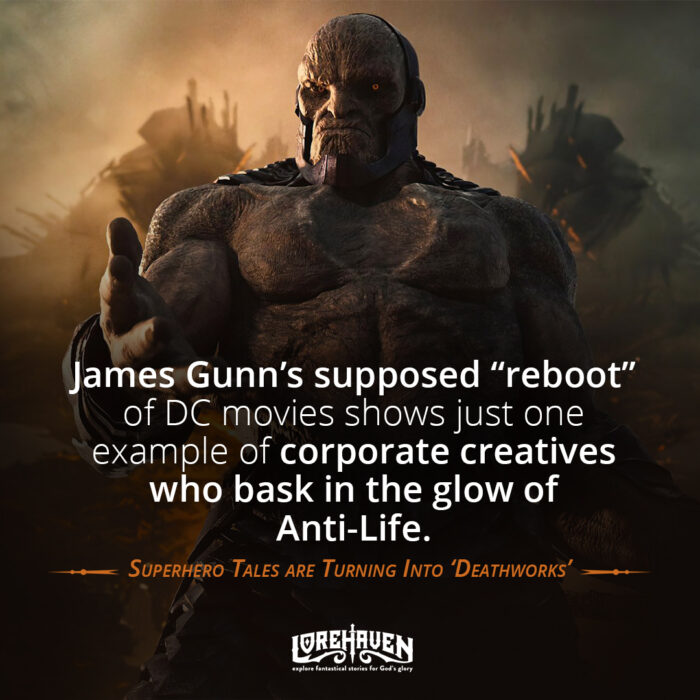







My favorite superhero movies will always be Superman 1 and 2 starring Christopher Reeves. Not that big a fan of the genre, and I’m tired of it since it’s being done to death. But why did Gunn choose to write screenplays for a niche he has grown to hate?
Different strokes for different folks. I’m not saying superhero films are “bad” and I wouldn’t want to spoil them for those who enjoy them.
I just want more characters like Bilbo or Frodo Baggins. Only four feet high and the latter takes on the supernatural evil of the dark lord Sauron threatening to destroy the world he loves. No supernatural powers–except the Ring which he is forbidden to use.
Funny how no one wants to “gender swap” Frodo. Yet a female protagonist would be more believable (and likeable) filling a suffering servant role in a fantasy adventure than a Superman.
I like both those films, especially The Richard Donner Cut for “Superman II.” It restores the original gravitas-yet-fun emphasis of the maestro, Donner. A second maestro, Zack Snyder, definitely shifted the gravitas-yet-fun ratio toward the former. Yet I equally if not more love “Man of Steel” and the rest of this series as a beautiful exploration of how our world, not just a happy-go-lucky-movie-land, would truly react to Kal-El’s arrival.
Donner specifically opposed the kind of cynicism others wanted for Superman:
“I was brought up with Superman as a kid. … There was a whole point in my life where I read Superman. So when I was finished with [the original script that was cynical, indulgent, and disrespectful to Superman], I was like, ‘Man, if they make this movie, they are destroying the legend of Superman.’ I wanted to do it just to defend him.”
https://strasburgfilm.com/verisimilitude-how-richard-donners-superman-changed-film-forever/
As fans know, WB back in the 70s–80s also got rid of Donner, and hired the “slapstick comedy” director Richard Lester to take over film 2 and handle film 3. The results were disastrous, marking the first time that a Superman film franchise was destroyed by WB.
James Gunn is a cynical, indulgent, and disrespectful movie-maker. He literally said he had no interest in making a Superman movie because he favors lesser-known comic book figures—which, in my view, he can then remake in his own spiteful image, then get away with it because he adds cute little critters and snarkiness that folks enjoy.
I saw a review for Brightburn and a couple for The Boys. I could only enjoy a movie about evil super characters if they were not the focus. If there were loveable, good but “weak” heroes we could cheer for.
But that would be a super villain movie.
By their nature superheroes are unrelatable. Probably why they fare better in comics or movies than written fiction. In ancient times they had spoken and performative stories and loved “super” characters too. Though at least half the time the stories focused on ordinary people rather than super demigods like Hercules or the Olympus crowd.
Interesting how we seem to have come full circle in our stories.
Oral to written to pictured…and oral again.
Brandon Sanderson’s series “The Reckoners” is exactly this kind of story: superpowered humans are evil, but the ordinary/weak humans are good and noble. You definitely cheer for them. It’s still very much about heroes.